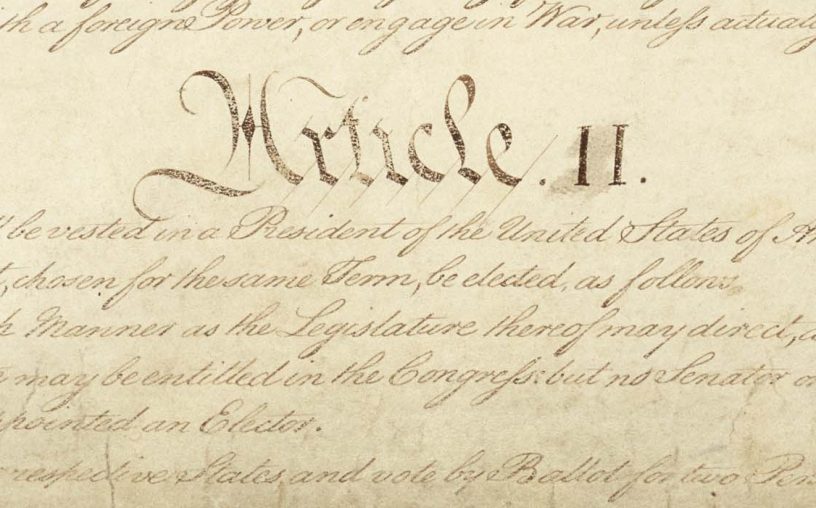On January 2, Andy Barr, Kentucky’s 6th District congressional representative, commenced a tweet-storm. A “storm” by his standards, anyway; he’s normally good for no more than a handful of tweets per week, but between the announcement of the missile-strike assassination of Qasem Soleimani and the time of this writing on January 7, Barr issued 30 of them.
Of those, 26 concerned the assassination and its aftermath. Again, quite a lot by Barr’s standards, but what seems more remarkable than the sheer quantity of the tweets are the arguments he makes within them—(1) unquestioning support of the legality of the strike, (2) unwavering belief in its positive outcomes, and (3) disdain for “left-wing polticians” who question either (1) or (2). Regardless of the correctness of these arguments, what some readers might find most maddening is the shoddiness of the reasoning Barr uses to support his positions.
Let’s begin chronologically. Barr began the morning of January 2 with a tweet re-posting his pre-Christmas complaint about the House’s impeachment of the president (to which Lexington council member Steve Kay responded accurately and succinctly in a Herald Leader op-ed of December 23), followed by an announcement of his upcoming office hours in the northern counties of KY-6.
Then, that evening, the White House announced the assassination, at which point Barr embarked on a sustained defense of the action, beginning with the blanket claim that the strike represented a “massive victory.” It may be, or it may not be, but by the following evening, Barr would brook no questioning:
Let me get this straight: The same left wing politicians who defended Obama/Clinton inaction leading to 4 dead Americans in Benghazi now apologize to our enemy in Iran when @realDonaldTrump takes decisive action to eliminate an imminent threat to our Embassy in Baghdad? Got it.
— Rep. Andy Barr (@RepAndyBarr) January 3, 2020
Who apologized to Iran, exactly? It’s reported that actress Rose McGowan did so, and while she may well be “left wing,” she certainly isn’t a politician, though it’s possible she once played one on television. Then to whom is Barr referring? Probably no one. The target here seems to exist only in the fevered imaginations of Barr’s base; merely by combining the keywords “left wing,” “Obama/Clinton,” and “Benghazi,” Barr, cynically, knew that he’d gotten ahead of the story, as it were. By inventing enemies and positioning his reaction to the assassination in moral opposition to them, the first part of his job was done.
The second part? Rise above it all:
General Mark Milley, Chairman of the Joint Chiefs of Staff: There was “clear and unambiguous intelligence that Soleimani was planning a campaign against the U.S.” Sure makes the President’s critics look petty and partisan.
— Rep. Andy Barr (@RepAndyBarr) January 4, 2020
That’s right: only one tweet after blaming non-existent left wingers for being soft on terrorism, Barr claimed to be above the “petty” and the “partisan.” One might admire the sheer chutzpah here, and perhaps applaud the political acumen, but these paired tweets are a classic example of the straw man fallacy. From RationalWiki:
A straw man is a logical fallacy which occurs when a debater intentionally misrepresents their opponent’s argument as a weaker version, and rebuts said version — rather than their opponent’s genuine argument. Intentional strawmanning is usually done with a certain goal in mind, including:
1. Avoiding real debate against an opponent’s real argument, because the misrepresenter risks losing in fair debate
2. Making the opponent’s position appear ridiculous as a way of poisoning the well
The real argument of those who questioned the assassination involved the constitutional authority of the executive branch to order an act of war without congressional authorization and the reliability of the intelligence invoked to justify the missile strike, but tangling with those questions would be engaging in “real debate.” Better, at least at this point, to avoid. And “poisoning the well?”
Poisoning the well (also called the smear tactic) is a rhetorical technique and logical fallacy that uses the association of negative emotions to distract a subject from actual evidence in an argument.
You hate the libs? Blame Obama? Still mad as hell at Clinton for Benghazi? With that well good and poisoned, Barr is essentially claiming that anyone who dares question the assassination on even quite legitimate grounds is in league with terrorists. But that’s not logical. Not even a little bit.
Still, the problem with well-poisoning is that you might get some of the poison on yourself. Thus Barr’s next tweet:
Let us come together, regardless of party, and be grateful for this massive victory which has saved American lives.
— Rep. Andy Barr (@RepAndyBarr) January 4, 2020
Ah—he’s claimed the moral high ground. Nothing washes one’s own sins clean like a call to national unity. Never mind that two tweets ago Barr was attacking left wingers and raising the specter of Libya. He’s risen above all that dirtiness; won’t we join him in the cleansing, life-saving light of non-partisan righteousness?
That was January 3. But on January 4, perhaps once he’d had more time to prepare, and probably realized that his straw men were being blown down in the winds of the national media, he began to engage with the real arguments his colleagues on the other side of the aisle were making about the assassination. He started with a legitimate appeal to authority:
To my colleagues complaining about the absence of congressional authorization for the Soleimani strike, a helpful reminder: Article II, Section 2 of the Constitution provides: “The President shall be Commander in Chief of the Army and Navy of the United States.”
— Rep. Andy Barr (@RepAndyBarr) January 4, 2020
No problem there. That how the Constitution reads. But it also assigns declarations of war to the legislative branch, which, to his credit, Barr acknowledged in his subsequent tweet, noting that “the Constitution gives Congress the sole power to declare war and the sole power of the purse to either fund or defund military action.”
A strong argument should always address counter-arguments, and that’s what Barr is doing here. He did, after all, go to college, where they teach such things. So was the assassination an act of war that should have received congressional authorization, or was it an act of self-defense, to which the president might respond quickly and decisively without such authorization, as is his constitutional right? Good question, though Barr took perhaps a day too long to finally try to answer it.
His answer, unfortunately, isn’t so good, at least not in the reasoning he chooses to support it:
In recent years, the Justice Department’s Office of Legal Counsel (OLC) has opined that the Constitution authorizes the President, as Commander-in-Chief, to order military action without congressional permission…
— Rep. Andy Barr (@RepAndyBarr) January 4, 2020
This, as you’d might expect, gets complicated very quickly, and I’m no constitutional scholar. If you’d like to read Barr’s complete thread, go to his Twitter feed, and for an enlightening discussion of all the legal issues involved in the assassination, you can’t do much better than Lawfare. But what I do find problematic is Barr’s immediate invocation of the Office of Legal Counsel as the sole arbiter of the assassination’s constitutional basis. In short, the OLC is an agency of the executive branch, and it “provides legal advice to the President and all executive branch agencies.”
What Barr is doing, then, is making the claim that the executive branch of the U.S. government had the authority to assassinate Soleimani because the executive branch said it had the authority to assassinate Soleimani. This argument looks an awful lot like the fallacy of circular reasoning:
Circular reasoning (often begging the question) is a logical fallacy that occurs when the conclusion of an argument is used as a premise of that same argument; i.e., the premises would not work if the conclusion weren’t already assumed to be true.
Put another way, Barr is concluding that the assassination was lawful because the people who carried out the assassination have claimed it was lawful.
In the us-versus-them environment of U.S. politics, Barr’s position is unsurprising. He’s been nothing but consistent in his unquestioning support of the current presidential administration. But what one might find troubling is his eagerness to so quickly cede the authority of his own branch of government—the legislative—which, after all, is designated by the Constitution as being co-equal in governing power to the executive and judicial. In broader terms, Barr, who claims on his house.gov web page to support policies “that would restore the balance of powers as intended by the founders of our nation,” and who elsewhere has professed to support “limited government” and the prevention of “executive overreach,” is now perfectly happy to allow the executive branch to claim a rather expansive view of the president’s Article II powers.
Barr concluded his tweet-storm this morning by asserting the “celebrating” of Soleimani’s assassination by “anti-Iran Iraqis.” Perhaps they are; news reports conflict. And it’s possible that the assassination does mean “the world is a better place,” and he claimed last Friday. Barr can certainly make that argument, but he should use stronger reasoning to do so.





Leave a Reply